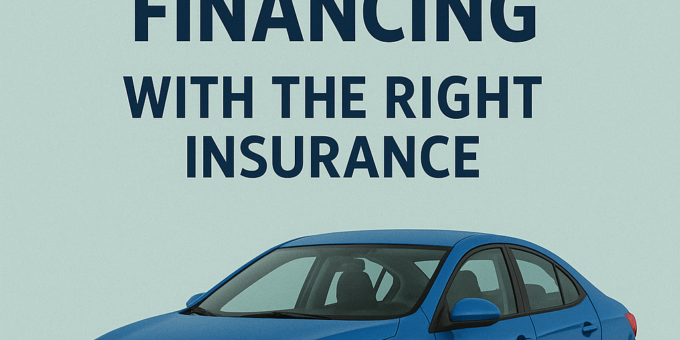
Introduction
When it comes to buying a car, getting financing is only half the journey—having the right insurance is the key that turns the ignition. In fact, lenders won’t even release funds without proof of insurance that meets their requirements. That’s why understanding how financing and insurance work together is essential if you want fast approval and a smooth ride into car ownership.
This guide walks you through how to get approved for car financing, what insurance you need to qualify, and how both play a major role in securing the best deal. Whether you have stellar credit or you’re rebuilding, this strategy-packed resource is here to put you in the driver’s seat.
The Link Between Financing and Insurance
When you finance a car, the lender technically owns it until you pay it off. To protect their investment, they require specific types of insurance coverage.
Without the right coverage, you risk loan denial or, worse, loan cancellation after approval. That’s why you’ll often hear this golden rule:
“No insurance = no keys.”
Lenders want to know that their money—and your car—are safe.
Pre-Approval vs Final Approval
Pre-Approval
-
Based on credit score, income, and debt.
-
No insurance needed yet.
Final Approval
-
Insurance proof is required.
-
Car details must match the policy.
Tip: Start insurance shopping once you get pre-approved and have a car in mind.
Basic Requirements for Car Financing
Before any lender says “yes,” they’ll look for the following:
-
Credit Score: Most lenders prefer 620+, but many accept lower.
-
Proof of Income: Pay stubs, bank statements, or tax returns.
-
Employment Verification: Job stability is a big plus.
-
Valid ID & Residence Info
-
Down Payment: Not always required, but helps.
How the Right Insurance Boosts Your Financing Approval
Providing the correct type of insurance at the right time boosts confidence in your application.
Why It Matters
-
Shows you’re responsible
-
Speeds up final approval
-
Avoids last-minute delays
Lenders require a policy that lists them as the lienholder, so they’re alerted in case of a claim.
Steps to Prepare Before Applying
Preparation is everything. Here’s your quick checklist:
-
Check your credit score (Credit Karma or Experian)
-
Pay down outstanding debts
-
Save for at least a 10% down payment
-
Gather documents: ID, income proof, employment letters
-
Shop around for insurance quotes in advance
Types of Insurance Required by Lenders
Your lender will likely ask for:
-
Comprehensive Coverage – Protects against non-collision damage (theft, fire, weather).
-
Collision Coverage – Covers damages if you hit another vehicle or object.
-
Gap Insurance – Covers the loan balance if your car is totaled and insurance pays less.
-
Liability Insurance – Required by law, protects others if you cause an accident.
Understanding Lender Insurance Requirements
Typical Minimum Coverage Limits:
-
$100,000 bodily injury per person
-
$300,000 bodily injury per accident
-
$50,000 property damage
-
$500 deductible for comp & collision
Always confirm with your lender. Different lenders have different thresholds.
Common Mistakes That Hurt Your Chances
Avoid these pitfalls:
-
Not checking credit before applying
-
Providing a policy with insufficient coverage
-
Missing lender on the insurance policy as a lienholder
-
Underestimating your budget
-
Applying with incomplete documents
Low Credit Score? Here’s What to Do
Even if your credit score is under 600, you can still get approved.
How:
-
Get a co-signer with better credit
-
Make a bigger down payment
-
Try credit unions or subprime lenders
-
Show proof of consistent income
-
Shop for insurance deals that don’t inflate your DTI (debt-to-income) ratio
How to Find Lenders That Accept Your Profile
Not all lenders serve the same borrowers.
Explore:
-
Online Lenders: LightStream, Carvana, Capital One Auto Navigator
-
Credit Unions: Lower rates, flexible credit criteria
-
Dealership Financing: Great promos, but read the fine print
Choosing the Right Insurance Provider
Don’t just go with the first quote. Look for:
-
Competitive rates
-
Excellent customer service
-
Online access
-
Flexibility with payment schedules
-
Quick turnaround on policy activation
Top Insurance Picks:
-
Progressive
-
GEICO
-
State Farm
-
Root (for usage-based)
Combining Financing and Insurance Deals
Some lenders offer insurance when you finance. This can:
-
Save time
-
Offer package discounts
-
Make payments simpler
However: Compare total cost before bundling. Standalone policies are sometimes cheaper.
Car Loan Preapproval & Insurance Verification
When you’ve found the car and got preapproved:
-
Get a quote with the exact car details
-
Add lender as lienholder
-
Activate coverage
-
Submit proof to lender or dealership
That’s how you turn pre-approval into keys in your hand.
Instant Insurance for Immediate Loan Approval
Need same-day coverage?
-
Use platforms like The Zebra, Policygenius, or Lemonade Auto
-
Get your policy within minutes, submit proof, and finalize your loan
Perfect for weekend or holiday car buys.
FAQs
Can I get a car loan without insurance?
No, lenders require proof of specific insurance coverage before releasing funds.
Do I need gap insurance?
If you’re financing a new car, yes. It protects against owing more than the car is worth.
Does the insurance policy need to be in my name?
Yes, and the lender must be listed as the lienholder.
Can I switch insurance after getting approved?
Yes, as long as coverage meets lender requirements.
What happens if I let my insurance lapse?
Your lender may force-place insurance—expensive and limited. Always maintain active coverage.
Conclusion
Getting approved for car financing is easier when you’re fully prepared—with documents, a solid credit strategy, and most importantly, the right insurance. Lenders want to know they’re making a safe bet, and by showing up with a policy that protects their interest, you increase your chances dramatically.
Make smart moves now, and you’ll drive off confident, covered, and completely in control.